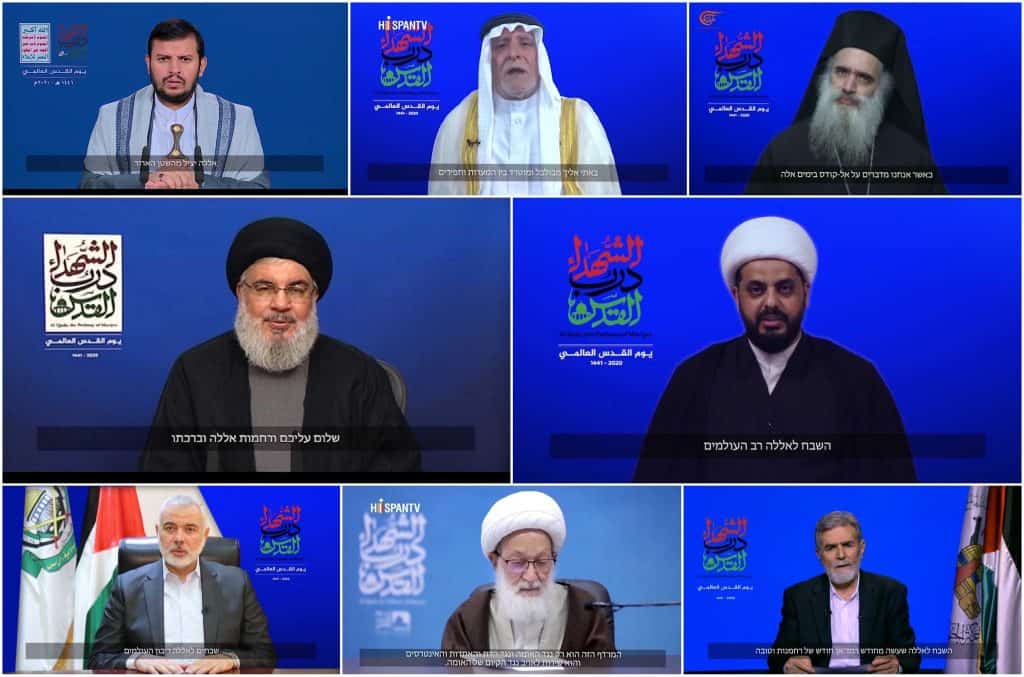
On May 20, leaders of the Axis of Resistance and pro-Axis clerics published videos commemorating International Quds Day with the central theme being the liberation of Palestine.
International Quds Day, which was introduced by the Islamic Republic of Iran in 1979, is held every year on the last Friday of Ramadan. The day is marked by protests against Israel across the region. Protesters burn flags of Israel and the United States as a way to show solidarity with the Palestinian people.
Hamas’ political leader Ismail Haniyeh addressed viewers by deriding the Trump peace plan and Israel’s possible annexation of settlements in the West Bank.
“Today, as we commemorate the International Day of Jerusalem, Jerusalem lives in a most dangerous stage as we follow the American-Zionist talk about implementing the so-called Deal of the Century, which is based on the liquidation of the Palestinian cause,” Haniyeh said.
Furthermore, Haniyeh warned Israel “From here I salute our people stationed in the blessed al Aqsa Mosque, and in their name and in the name of our people and our nation, we warn the Zionists against committing any foolishness against the blessed al Aqsa Mosque. We seek not only to liberate al Aqsa, but the whole of occupied Palestine.”
Hezbollah’s Secretary-General Hassan Nasrallah commemorated Quds Day by addressing viewers about the strengthening of ties between members of the Axis of Resistance. Nasrallah also affirmed the Axis of Resistance was “closer than ever to liberating al Quds.”
“Thanks to the cooperation of between countries and the forces of the Axis of Resistance of the Arab and Islamic world, we find ourselves closer than ever to al Quds and its liberation,” Nasrallah said.
Nasrallah also noted “The Israeli authorities are afraid and terrified by the victories of the Axis of the Resistance. They are also disappointed by the defeats suffered not only by this regime [Israel] but also by the United States and its allies in the Middle East.”
Another Axis leader, Abdul-Malik al Houthi, used his address to touch on several subjects regarding Israel and Saudi Arabia.
Al Houthi maintained his movement’s position regarding relations with Israel saying “We condemn and reject all attempts to normalize relations that some Arab countries, especially the Saudi regime, have attempted with the Israeli enemy.”
Houthi also renewed his offer of to exchange captured prisoners of war for member of Hamas in Saudi jails.
“We reiterate our previous offer of liberating the kidnapped Palestinians, the prisoners in the Saudi regime’s jails. We renew our offer to release a Saudi pilot and five soldiers as a part of this deal. We advise the Saudis to accept this offer for the benefit of its pilots, soldiers and officers,” Houthi said.
Ziad Nakhala, The Secretary-General of Palestinian Islamic Jihad, utilized his address to call on the Islamic people to unify and support the Axis of Resistance.
“If we can’t put our differences aside we will remain weak and that will benefit the enemy. Please, let’s get over these differences and reach a national consensus in support of the Resistance.”
Lastly, Khais al Khazali, the leader of Asaib Ahl al Haq, which is a part of Iraq’s Popular Mobilization Forces, accused Israel and the United States of conspiring against the Iraqi people.
“The Zionist enemy attacked the positions of the Popular Mobilization Forces under the cover of American forces who supposedly is in charge of guaranteeing airspace over Iraq. Furthermore, the United States, the great patron of terrorism, the financier of al Qaeda and Da’esh (ISIS), are the ones who fulfilled the most heinous crime in the world, the assassination of PMF leader Abu Mahdi al Muhandis and his comrade, the pride of the Resistance, Hajj Qasem Soleimani. It is true, the ones who carried out this assassination were Americans, but the decision was Israeli, purely Israeli.”
Most of the messages by Axis leaders and clerics fell in line with previous comments they have made. The shared message being the liberation of Jerusalem, Iranian support for the Axis of Resistance and the duty of Arab countries to thwart the American-Israeli “conspiracy” for peace in the region.
However, some leaders such as Khazali, took a harder line against Israel and the United States attempting to portray both countries as criminals and co-conspirators against Iraq and all Arab countries. Furthermore, al Houthi took the time to try to advance his movement’s agenda by mentioning a renewed offer of a prisoner exchange with Saudi Arabia.
The coordinated publication by the Axis of Resistance is an attempt to establish itself as a unified front with clearly stated goals. The publications were translated in multiple languages including Hebrew which directly targeted Israeli viewers. Although, it’s intended effect did not likely last due to the grammar errors in the Hebrew translation. Despite the inaccuracy in the translation, the message is clear: The Axis of Resistance with Iranian-backing is willing to go to great lengths to fulfill its stated goal of removing Israel and the U.S. from the region.







